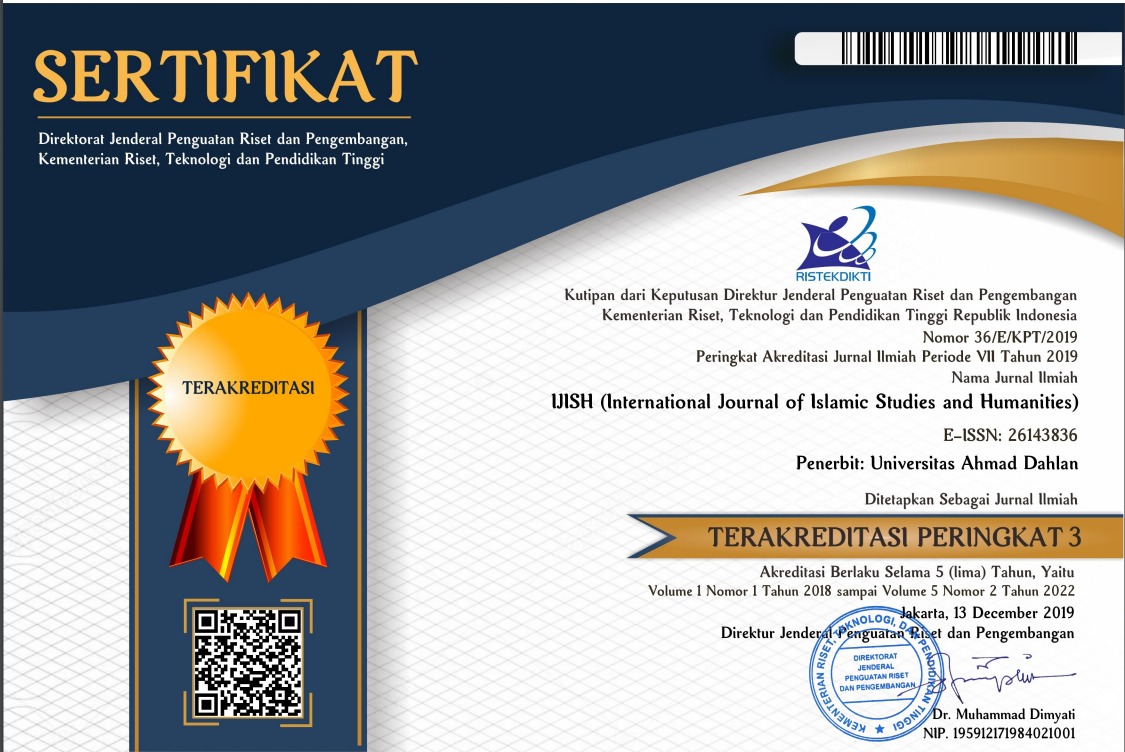Ethical Dimension of Maqasid al-Shari'ah and its Implication to Human Capital Development
DOI:
https://doi.org/10.26555/ijish.v4i1.2621Keywords:
Maqasid al-Shari’ah, Material Realm, Ethics, DevelopmentAbstract
Abstract
The prescriptions of Shari'ah are aimed at protecting six critical areas of human needs namely; life, religion, mental health, offspring, property, and dignity. Maqasid al-Shari'ah were earlier treated as an aspect of Maslahah Mursalah (public utility). They were treated as separate principles aiding the understanding of the wisdoms and intents of the texts. Transformation in the pattern of life of modern societies caused expansion in the scope of Maqasid. In modern times, Maqasid include aspects of material development that feature in Human Development Index. This paper employed theoretical method and analyzed the ethics embodied in the objectives of Shari'ah. The aim is to find out how the ethics shape human conduct and facilitate non-material aspects of human capital development. Its findings are that, the objectives of Shari'ah on the protection of religion, life, and mind can refine conduct, inspire morality, develop and secure the mind. Thus, the ethics imbued in Shari'ah instructions transform individuals into worthy citizens, shape their life and conduct, and make them productive and sensitive about the well-being of fellow human beings. These changes in human conducts by means of Shari'ah-inspired ethical transformation are a form of non-material aspects of human capital development.
References
Abu Zahra, Muhammad (ND), Usul al-Fiqh, Beirut, Dar al-Fikr.
Al-Bukhari, Muhammad bn. Isma’il, (ND), Al-Jami’ al-Sahih al-Musnad al-Mukhtasar
min Umuri Rasulillah wa Sunanih wa Ayyamih, vol.4, Beirut, Dar Tauq al-Najat.
Ali, Salman Syed and Hamid Hasan,(2014) “Towards a Maqasid al-Shariah Based
Development Index,†IRTI Working Paper Series, Jeddah, Islamic Research and
Training Institute.
Al-Khadimi, Nuruddeen bn Mukhtar, (2001), Ilm al-Maqasid al-Shar’iyyah, NP,
Maktabat al-Aykat.
Al-Shatibi, Abu Ishaq Ibrahim, (ND), al-Muwafaqat fi Usul al-Ahkam, vol.ii, Beirut, Dar
al-Fikr.
At-Tabari, Muhammad bn. Jarir, (2000), Jami’ al-Bayan ‘an Ta’wil Ayial-Qur’an, vol.iii,
NP, Muassasat al-Risalah.
Auda, Jasser, (2008), Maqasid al-Shari’ah an Introductory Guide, London, International
Institute of Islamic Thought (IIIT).
Chapra, M. Umer, (ND), Islamic Vision of Development in the Light of Maqasid al-
Shari’ah, Jeddah, Islamic Research and Training Institute, www.irti.org, retrieved
on 10th-08- 2016.
Ibn.Ashur, Muhammad Tahir, (2006), IbnAshur’s Treatise on Maqasid al-Shari’ah,
translated By Muhammad Tahir El-Mesawi, London, International Institute of
Islamic Thought (IIIT), www.iefpedia.com, retrieved on 05th-11-2016.
Ibn. Kathir, Isma’I bn Umar, (1999), Tafsir al-Qur’an al-Adhim, 2nd Edition, N.L. Dar
Taybah.
Kamali, Muhammad Hashim, (1991), Principles of Islamic Jurisprudence, Cambridge,
Islamic Text Society.
Khallaf, Abdulwahab, (1375 A.H.), ‘Ilm Usulal-Fiqh, NP, Dar al-Qalam.
Nyazee, Imran Ahsan Khan, (2000), Islamic Jurisprudence, Islamabad, International
Institute of Islamic Thought (IIIT).
Raysuni, Ahmad, (1992), Nadhariyyat al-Maqasidinda al-Imam al-Shatibi, NP, Dar al-
Ilmiyyah.
Yadudu, Auwalu Hamisu (1993), " Prospect for Shari'ah in
Nigeria" in Nuru Alkali et. al. (eds), Islam in Africa:
Proceedings of Islam in Africa Conference, Ibadan,Spectrum.
Yusuf, S.M (1978), The Supremacy of Islamic Shari'at in Islamic
Society, Ankara, Sevinc Matbaasi.
Zaydan, Abdulkarim (1996), Al-Wajiz Fi Usul al-Fiqh, Berut, Ar-
Risalah Publishing House.
Downloads
Published
How to Cite
Issue
Section
License
Copyright (c) 2021 Nasir Muhammad Abdulhameed

This work is licensed under a Creative Commons Attribution-ShareAlike 4.0 International License.
Authors who publish with IJISH (International Journal of Islamic Studies and Humanities) agree to the following terms:
- Authors retain copyright and grant the journal right of first publication with the work simultaneously licensed under a Creative Commons Attribution License (CC BY-SA 4.0) that allows others to share the work with an acknowledgment of the work's authorship and initial publication in this journal.Â
- Authors are able to enter into separate, additional contractual arrangements for the non-exclusive distribution of the journal's published version of the work (e.g., post it to an institutional repository or publish it in a book), with an acknowledgment of its initial publication in this journal.
- Authors are permitted and encouraged to post their work online (e.g., in institutional repositories or on their website) prior to and during the submission process, as it can lead to productive exchanges, as well as earlier and greater citation of published work.

This work is licensed under a Creative Commons Attribution-ShareAlike 4.0 International License.






